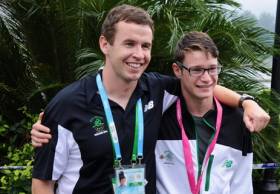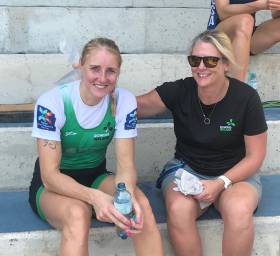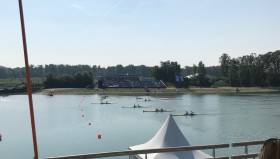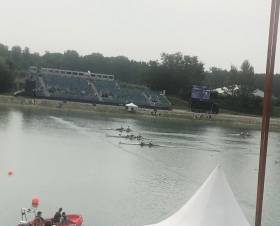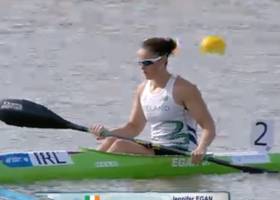Displaying items by tag: World Championships
#Rowing: Ireland will send a big team to the World Coastal Rowing Championships in Hong Kong early next month (November 1st to 3rd). Coastal Rowing is growing and may become part of the Olympic programme.
Niall O’Toole (49) was Ireland’s first world rowing champion. The three-time Olympian now runs Crew Class for indoor rowers. He tried his luck at the Irish Offshore Rowing Championships in September in Co Antrim. Here are his impressions.
The Rock’n Roll of Offshore Rowing
By Niall O’Toole
I was excited for my first offshore race. Rounding the corner, I arrived at the location to big breaking waves crashing onto the shoreline. I immediately knew this was something different: it was going to be ugly and unpredictable.
I fully hoped that the regatta would be called off, due to the extreme weather conditions. I looked to other competitors for solace. Instead of being able to gauge their fear, I was met with wide grins and a crazy glint in their eyes: they were unfazed. This was their normal. They were just looking forward to getting amongst it.
I’m used to something different. A sterile environment in your own lane, as fast as you can row from A to B over 2km. You train for your own race, your pace and pushes planned down to a T. You have very little to think about on the day, other than executing that race plan. A starter holds your stern, everyone in line, traffic lights signal the off. It’s all inch-perfect and highly controlled. You may have one or two glances out of the boat, but essentially you row without interference from others.
In Olympic-style rowing, we are guarded from the elements. Most international courses are strategically located to have a prevailing wind in one direction to avoid rough water. If there is wind, the water tends not to be affected. I wasn’t used to nature writing the rules.
There was a delay to racing due to a late change of course. We were told that it was no longer safe for the safety boats, and that rowers were likely to be pushed onto the rocks. When the officials said, “You need to ask yourself, is it safe for you to row today?” the answer was screaming in my head. The organisers said they’d run the first race and would review whether they would continue the regatta after that. I took this to mean that the first race competitors were now officially the canaries down the mine. They got around, despite buoys moving during the race, and the regatta continued, to my growing fear and dismay.
Shouldered with the weight of some rowing heritage behind me, I had to harness my dwindling toughness and get out onto the water, launching amidst breaking waves on the beach. Within 30 seconds I was completely soaked and instantly thought we needed a bigger boat.
The race starts with a floating start and is the only real part that you can plan. There are no individual lanes, just a fight for the best line around a 4km course of buoys. Your only real hope is to fly out the start and get clear of the field down to that all important first buoy, before traffic starts hitting you and rowing becomes a contact sport.
Battling the elements, and trying to keep the boat straight without a tiller was absolutely exhausting. Given my experience, I went out high and hard, but found it difficult to factor in the added dimensions of staying away from other boats and staying on the right lines to hit the markers. Trying to keep the boat straight against a crushing side-wind completely seized up my forearm within minutes of the start. Within the washing machine of the wind and waves, and the physical exertion of breathing through your ears, you are punished for small navigational mistakes which are big errors, handing away hard-fought lengths to more savvy and seasoned competitors.
I did enjoy it though, despite myself. The rush of adrenaline you get flying around buoys, fighting for your line, with other boats breathing down your neck. You are completely focused on getting in and out of the turn as quickly as possible, whilst also paranoid that your competitor is taking a better line, for reasons as yet unknown to you. The sheer volume of data you have to integrate along with the physical exertion maxed me out in a way I couldn’t have imagined.
This is one hell of a sport. Chaotic, unpredictable and exhilarating. It really is the rock’n roll of rowing. I’m completely hooked.
Niall O’Toole was part of the winning men’s quadruple, a composite crew of Wicklow, Kilurin and Ring, at the Irish Offshore Championships.
Hendrick Qualifies for World Championship Semi-Finals
#Canoeing: Robert Hendrick qualified for the semi-final of the C1 (Canadian canoe) at the canoe slalom World Championships at La Seu d’Urgell today.
The Kildare man took 10th place in his second run – just inside the crucial cut-off point. Hendrick’s 99.03 seconds with no time penalties put him in 11th in the first set of results, but Italy’s Roberto Colazingari was then given a 50-second penalty for missing a gate and dropped out of the top 10. Hendrick had made it through.
Hendrick will qualify Ireland for a place in the C1 in Tokyo 2020 if he can place in the top 11 nations in the semi-finals.
Liam Jegou finished 13th, missing out on a qualification spot because of a two-second penalty for a touch on gate 11. Jake Cochrane, who was less than half a second outside qualification in the first run, did not do so well second time around and finished 49th. He missed gate five and incurred a 50-second penalty.
Canoe Slalom World Championships, La Seu d’Urgell, Spain (Irish interest)
Men
C1 – First Run (top 20 qualify directly): 26 J Cochrane 99.72, 38 R Hendrick 103.68, 46 L Jegou 106.38. SECOND RUN (top 10 to semi-finals): 10 Hendrick 99.03; 13 Jegou 99.62, 49 Cochrane 151.72
Women
K1 – First Run (top 20 qualify directly): 72 H Craig 182.68, 75 A Conlan 195.02, 76 C O’Ferrall 245.62. SECOND RUN (top 10 to semi-finals): 41 Conlan 133.13, 45 O’Ferrall 148.39, 51 Craig 174.61
Puspure Wins Gold, Silver for Doyle and Byrne at World Rowing Championships
#Rowing: Sanita Puspure and the men's double scull of Philip Doyle and Ronan Byrne took gold and silver for Ireland on the final day of the World Rowing Championships in Linz-Ottensheim.
Puspure was set a very hard challenge by her friend and rival Emily Twigg of New Zealand, who led right through the middle of the race.
On a hot day, Puspure had to call on all her resources to catch and then pass Twigg. She did this in the final quarter, and then drove on to win well.
Ireland completed the set of gold, silver and bronze medals at the World Rowing Championships as Philip Doyle and Ronan Byrne raced a brilliant second half of their double sculls final to take silver. China were outstanding, while Ireland trailed early on but built their speed and passed all the other contenders. They were less than a boat length away from China, who took the gold.
In the run-up to Sunday, the lightweight double scull had taken gold and pararower Katie O'Brien bronze.
World Rowing Championships, Linz-Ottensheim, Day Eight (Irish interest)
Men
Double Sculls - A Final: 1 China 6:05.68, 2 Ireland (P Doyle, R Byrne) 6:06.25, 3 Poland 6:07.87.
Women
Single Sculls - A Final: 1 Ireland (S Puspure) 7:17.14, 2 New Zealand (E Twigg) 7:20.56, 3 3 United States (K Kohler) 7:22.21.
McCarthy and O'Donovan Speed Past Opponents to Win Gold
#Rowing: Paul O'Donovan and Fintan McCarthy became the world champions in the lightweight double sculls with an outstanding victory over Germany and Italy here in Linz-Ottensheim.
The men in blue and red and white disputed the lead through the first quarter of the race, with Ireland a length behind in sixth. From there O'Donovan and McCarthy put the foot down. They set the fastest time for the next three quarters, accelerating into the headwind and clawing their way to level and then past their two big rivals.
They kept going right to the end and beat the Italians by just over a length, with Germany taking the bronze.
World Rowing Championshiops, Linz-Ottensheim, Day Seven (Irish interest)
Men
Lightweight Double - A Final: 1 Ireland (F McCarthy, P O'Donovan) 6:37.28, 2 Italy 6:39.71, 3 Germany 6:41.07.
Women
Four - B Final (First Two book Olympic places for boat): 1 Britain 6:55.08, 2 Canada 6:56.99; 3 China 7:02.28, 4 Ireland Ireland (T Hanlon, E Lambe, A Keogh, E Hegarty) 7:02.71.
Pair - B Final (First Five book Olympic places for boat): 1 Romania 7:18.88, 2 Ireland (A Crowley, M Dukarska) 7:20.68.
Lightweight Double Sculls - C Final (Places 13 to 18) 1 China 7:00.82; 5 Ireland (A Casey, D Walsh) 7:10.52.
Dukarska and Crowley Take Olympic Place For Ireland Pair
#Rowing: Monika Dukarska and Aileen Crowley booked another place for Ireland at the Tokyo Olympic Games this morning. They took second in the pairs B Final at the World Championships in Linz, well inside the top five which would have qualified the boat.
They led early on, but were passed by Romania in the third quarter. As they field chasing the Olympic spots closed, Ireland clung on to second.
(Irish interest)
Women
Pair - B Final (First Five book Olympic places for boat): 1 Romania 7:18.88, 2 Ireland (A Crowley, M Dukarska) 7:20.68.
Lightweight Double Sculls - C Final (Places 13 to 18) 1 China 7:00.82; 5 Ireland (A Casey, D Walsh) 7:10.52.
#Ireland had a special hour here at the World Rowing Championships in Austria, featuring a medal and another wonderful performance by Sanita Puspure, which booked a place for her boat in Tokyo, following the qualification of the men's double and lightweight double.
The medal came through Katie O'Brien, who celebrated her 23rd birthday by taking bronze in the women's PR2 final. Kathryn Ross of Australia was outstanding in taking gold, while O'Brien persisted through a tough race for her and gave Annika van Der Meer of the Netherlands a contest for the silver medal coming up to the line.
O'Brien would hope to compete in the Paralympic Games, but this requires her to find a male partner with a similar disability of the lower limbs.
Puspure won her semi-final of the women's single sculls, and qualified for the A Final, with the added bonus of a place in the top nine and thus a Tokyo place for this boat. The line-up was filled with quality: in particular, New Zealand's Emma Twigg would have targeted beating the Ireland sculler.
After a close first quarter, Puspure steadily extended a small lead into over a length by the final 500 metres. She would not be headed from there. Twigg took second and Carling Zeeman of Canada third. Local favourite Magdalena Lobnig lost out.
Kara Kohler of the United States won the first semi from Vicky Thornley of Britain and Jeannine Gmelin of Switzerland.
World Rowing Championships, Linz-Ottensheim, Day Six (Irish interest)
Men
Lightweight Quadruple - B Final: 1 United States 6:03.94, 2 Ireland (H Sutton, M Taylor, R Ballantine, J McCarthy) 6:06.62.
Double - A/B Semi-Final Two (First Three to A Final; rest to B Final): 1 Ireland (P Doyle, R Byrne) 6:13.88, 2 Romania 6:14.86, 3 Britain 6:15.84.
Lightweight Single - B Final (places 7 to 12): 1 Austria (R Kepplinger) 7:00.16; 4 Ireland (G O'Donovan) 7:02.18.
Women
Single Sculls - A/B Semi-Final Two (First Three to A Final; rest to B Final): 1 Ireland (S Puspure) 7:28.53, 2 New Zealand (E Twigg) 7:32.7, 3 Canada (C Zeeman) 7:34.25.
Lightweight Single - B Final (places 7 to 12): 1 Australia (Alice Arch) 7:52.59; 5 Ireland (L Heaphy) 7:55.40.
Pararowing - PR2 Final: 1 Australia (K Ross) 9:37.30, 2 Netherlands (A van Der Meer) 9:56.84, 3 Ireland (K O'Brien) 10.01.64.
O'Driscoll and O'Donovan End Campaign on a Winning Note
#Rowing: The men's pair of Mark O'Donovan and Shane O'Driscoll won their E Final at the World Rowing Championships in Linz-Ottensheim. The Skibbereen men led right through and saw off nearest challengers, Lithuania.
World Rowing Championships, Linz-Ottensheim, Austria - Day Five (Irish interest)
Men
Pair - E Final (Places 25 to 28): 1 Ireland (M O'Donovan, S O'Driscoll) 6:36.3
Lightweight Double Sculls - A/B Semi-Final Two (First Three to A Final; rest to B Final): 1 Ireland (F McCarthy, P O'Donovan) 6:13.46, 2 Germany 6:13.59, 3 Norway 6:14.15.
Lightweight Single Sculls A/B Semi-Final One (First Three to A Final; rest to B Final): 6 Ireland (G O'Donovan) 7:34.01.
Women
Four A/B Semi-Final Two (First Three to A Final; rest to B Final): 1 Australia 6:25.34, 2 Denmark 6:28.58, 3 Romania 6:30.96; 4 Ireland (T Hanlon, E Lambe, A Keogh, E Hegarty) 6:32.37.
Pair - A/B Semi-Final One (First Three to A Final; rest to B Final): 1 New Zealand 6:57.92, 2 United States 7:01.78, 3 Italy 7:01.80; 4 Ireland (A Crowley, M Dukarska) 7:03.05.
Lightweight Double Sculls - C/D Semi-Final One (First Three to C Final; rest to D Final): 3 Ireland (A Casey, D Walsh) 7:01.68.
Lightweight Single Sculls A/B Semi-Final One (First Three to A Final; rest to B Final): 6 Ireland (L Heaphy) 7:42.23.
Thrilling Semi-Final Win By O'Donovan and McCarthy Sends Ireland Boat to Olympic Games
#Rowing: Ireland's first boat qualified for the 2020 Olympic Games is the lightweight men's double. Fintan McCarthy and Paul O'Donovan won in a thrilling semi-final here in Linz-Ottensmeim to take an A Final place at the World Championships and land a berth for the boat in Tokyo.
This was classic Paul O'Donovan. He gelled with his new partner, McCarthy, to produce a perfectly-judged finish which pushed Germany into second - by 13 hundredths of a second. Norway, like Ireland, had watched Germany and Australia do the early work, then closed on them in the final stages. The Norway crew of Are Strandli and Kris Brun, who were bronze medallists behind Ireland's silver in Rio 2016, produced the fastest finish of all to take third. Australia fell back to fifth.
All six A Finalists and the eventual winner of the B Final qualify boats for Tokyo 2020.
The Ireland women's pair of Aileen Crowley and Monika Dukarska will have to make their way through the B Final (placing fifth or better) if they are to qualify the boat for the Olympics. They finished fourth in a hotly-contested semi-final. New Zealand won with a commanding performance; the United States forced their way into second; the battle was joined between Ireland and fast-finishing Italy, who took the crucial third place.
World Rowing Championships, Linz-Ottensheim, Austria - Day Five (Irish interest)
Men
Lightweight Double Sculls - A/B Semi-Final Two (First Three to A Final; rest to B Final): 1 Ireland (F McCarthy, P O'Donovan) 6:13.46, 2 Germany 6:13.59, 3 Norway 6:14.15.
Women
Pair - A/B Semi-Final Two (First Three to A Final; rest to B Final): 1 New Zealand 6:57.92, 2 United States 7:01.78, 3 Italy 7:01.80; 4 Ireland (A Crowley, M Dukarska) 7:03.05.
Fine Start at World Championships by Katie O'Brien
#Rowing: Katie O'Brien took a fine third place in her first race of the World Rowing Championships. The Galway woman's contest came in a preliminary round - but it was a notable contest, as Kathryn Ross of Australia won in a new world's best time of nine minutes 24.99. Behind her Annika van Der Meer of Netherlands fought it out with O'Brien, who finished well to the cheers of the Irish crowd in the grandstand.
World Rowing Championships, Day Four (Irish interest)
Women's PR Two Single Sculls, Preliminary Race: 1 Australia (K Ross) 9:24.99; 3 Ireland (K O'Brien) 9:52.13.
C Final Place for Jenny Egan at World Championships
#Canoeing: Jenny Egan took eighth in her semi-final of the K1 500 metres and moved into the C Final at the canoe sprint World Championships in Szeged in Hungary today. The top three qualified for the A Final and stayed in contention for qualifying places for the Olympic Games.
Barry Watkins finished ninth in the B Final of the men’s K1 1,000 metres, 18th overall, while Egan had taken sixth in the C Final of the K1 200m, 24th overall.
Canoe Sprint World Championships, Szeged, Hungary
Men
K1 1,000m – B Final: 9 B Watkins 3:47.24
Women
K1 200m C Final: 6 J Egan 6:43.49
K1 500m Semi-Final Three (First Three to A Final; 4-6 to B Final; 7-9 to C Final): 8 Egan 2:00.01.



























